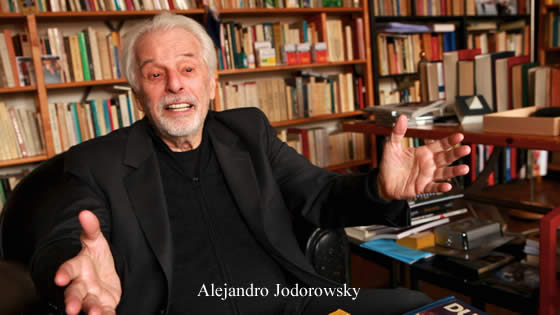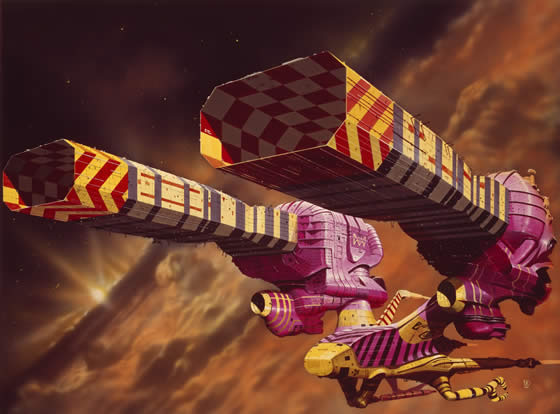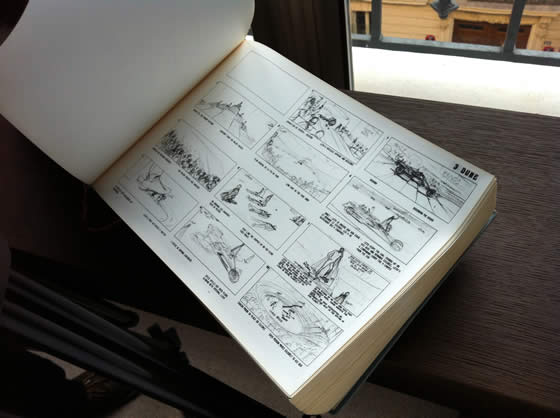 In 1975, Chilean director Alejandro Jodorowsky, whose films EL TOPO and THE HOLY MOUNTAIN launched and ultimately defined the midnight movie phenomenon, began work on his most ambitious project yet. Starring his own 12 year old son Brontis alongside
In 1975, Chilean director Alejandro Jodorowsky, whose films EL TOPO and THE HOLY MOUNTAIN launched and ultimately defined the midnight movie phenomenon, began work on his most ambitious project yet. Starring his own 12 year old son Brontis alongside
Orson Welles, Mick Jagger, David Carradine and Salvador Dali, featuring music by Pink Floyd and art by some of the most provocative talents of the era, including HR Giger and Jean ‘Moebius’ Giraud, Jodorowsky’s adaptation of Frank Herbert’s classic sci-fi novel DUNE was poised to change cinema forever.
For two years, Jodo and his team of “spiritual warriors” worked night and day on the massive task of creating the fabulous world of DUNE: over 3,000 storyboards, numerous paintings, incredible costumes, and an outrageous, moving and powerful script.
Through interviews with legends and luminaries including HR Giger (artist, ALIEN), Gary Kurtz (producer, STAR WARS) and Nicolas Winding Refn (director, DRIVE and ONLY GOD FORGIVES), and an intimate and honest conversation with Jodorowsky filmed over the course of three years, director Pavich’s film – featuring never-before-seen realizations of Jodo’s mind-blowing psychedelic space opera (animated by Emmy Award nominated Syd Garon) – finally unearths the full saga of ‘The Greatest Movie Never Made’.
Bijan Tehrani: What inspired you to make “Jodorowsky’s Dune”?
Frank Pavich: I think there were several things that inspired me and interested me. Obviously, Jodorowsky himself: I had been a fan of his movies for years and when I learned that he had this unrealized film, that was extremely interesting to me. I had never heard of an unmade film that was so fully realized; it was completely storyboarded out, 3,000 images, every camera move and every vehicle and every bit of wardrobe and everything was completely created and ready to go. That was an extremely fascinating thing. I thought, “What was it like to work on a project like that?” So many mirrors to craft all of your ideas, to get ready to film, and for that filming not to happen—for it to collapse. Then several years later, here come another director who successfully does tell that story. How does one deal with something like that, and that pain and that frustration? Those are the first things that drew me into the desires to tell this story.
BT: Jodorowsky is a big name is cinema, but there are a lot of film student and film fans who do not know him. I think that this film helps expose the work of a genius and a master.
FP: I hope so! My dream would be for this film to come out and people who know nothing about Jodorowsky to walk into it completely blind, and then after seeing it they would want to go seek out his work and find his old classic films. Perhaps they will see his new film, which will be released soon, and maybe read his book or look at his comics and kind of re-experience this man that has not quite received the widespread acclaim that I think he deserves.
BT: One thing that I also noticed is that his work is so amazing that you can see his influence throughout decades of filmmaking.
FP: You see it in filmmaking and you see it everywhere. Just a few months ago they were saying that the Kanye West stage show was based on “The Holy Mountain”, so to have a hip-hop star in 2013 take influence from one of Jodorowsky’s films from 1973 shows just how influential his films are.
BT: How did you come up with the visual style of your film?
FP: We definitely wanted a very clear and less show style. To me, the big mistake would be if we were trying to copy Jodorowsky’s style, I have my own style and I think this film dictates a different style. We very clearly wanted to represent him in a serious way. I have seen other interviews with Jodorowsky and they, unfortunately, light him in a very harsh way and they try to get this kind of reaction out of him. We wanted to evoke a different picture of him, like a professor. He is not the mad man that people think he is, he is a very thoughtful, very spiritual artist and we wanted Jodorowsky to be the main storyteller and to be taking us on this journey, telling us what he went through, what he created, and what all of this stuff means.
BT: That style really helps us understand his work. How has the reaction been to your film so far?
FP: The response has been more than I ever could have imagined. Our premier screening was at the Cannes Film Festival last year, and it has continued from there. We screened at Telluride, Toronto, AFI fest, and all over the world. Audiences love it; we have won the audience award at 4 different film festivals. People see him on the screen and they are in love with him, they are enamored with him. To end up at the Cannes film festival and to be picked up for theatrical distribution by Sony Pictures Classics and to be starting out in NYC and LA, it is beyond my wildest dreams. I never would have imagined it would have been something as wonderful as this, and it is such a wonderful experience to not only to share the film with the audience, but also with Jodorowsky. That was a big dream of mine, to be able to share the film with the filmmaker. Jodorowsky loves the film and he thinks it represents him perfectly. 
BT: Some people hope that this film will encourage a Dune remake.
FP: I don’t think Jodorowsky has any desire to make it because he feels satisfied, he feels like he made his film, he got all of his ideas out there and he created this incredible world, so he feels satisfied. Even if another director were to come along, I wonder if the story of Dune could even be told anymore. There have been two successful versions, one from David Lynch and then the mini-series, so I wonder if there is any room for another one. I really think that without Frank Herbert’s novel, Star Wars wouldn’t have opened up on a desert planet. I wonder what an audience would find new in a Dune remake.
BT: Any new project that you are working on?
FP: This one has been so overwhelming that I feel like that it will be never ending; I am always delivering something or doing something for the film, but you always have your new ideas. I am not 100% sure what it will be but for me. It needs to be something that will make Jodorowsky proud, but something with the same intentions that he has and it has to have a positive influence in the world, possibly change the perception of people, their experiences, and to make them see something in a different light—that is the ultimate transformative power that cinema has.

